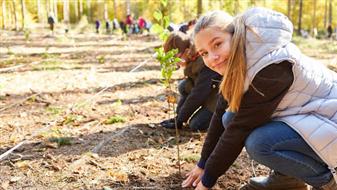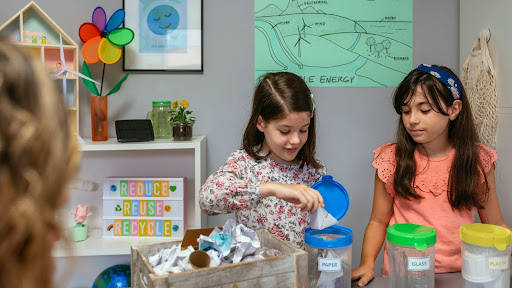
With sustainability becoming a core element of teaching and learning in the 21st century, schools across the world are focusing on boosting their sustainability initiatives. Learning for Sustainability (LfS) is a way of teaching and living that helps students, teachers, schools, and their communities work towards a fair, sustainable, and equal world. Keep reading to learn new ways of incorporating sustainability into your school’s programme.
How Can Schools Be More Sustainable?
In keeping with the move towards a carbon-neutral future, schools are exploring ways of embracing the UK government’s Environment and Climate Change Bill which addresses this objective. But incorporating sustainability into your curriculum shouldn’t be complicated, it’s all about making learning meaningful by combining lessons on being good global citizens, understanding how to protect our planet, and valuing outdoor activities.
1. Sustainable IT
As education becomes increasingly digitised, it’s imperative to address the environmental costs associated with it. To put things in perspective, a single laptop generates approximately 316 kilograms of carbon emission, accelerating global warming. This also adds strain on the school budget for brand-new IT. Recycling high-quality tech is an ideal alternative that combats these issues.
2. Classroom Composting
Landfills in the UK are filled predominantly with food waste and emit harmful gases like methane. Reducing food waste in schools can go a long way in combating this issue. Any leftovers from daily school lunches can be packed into clean food storage containers and reheated the next day. Additionally, vermicomposting bins can be set up in classrooms, providing additional opportunities to make learning more fun and interactive!

3. Zero Waste
To boost your school’s sustainability efforts, advocate a policy of zero waste, especially when it comes to school events. Minimise packaging required, and opt for recyclable wrappers, which can also be used for craft activities. Students can keep a weekly journal, recording how much food they waste and why. You could also encourage them to bring in their families’ single-use plastic to further the use of sustainable alternatives.
4. Environmental-friendly Cleaning Products
Whether for canteen tables or gym floors, cleaning products often have ingredients that can harm the environment. Schools should review the products they’re using and find environment-friendly alternatives if needed. Choosing products free from artificial additives can also minimise the risk of allergic reactions like asthma or contact dermatitis. They also come with recyclable packaging which is ideal.
5. Beach Clean School Trip
If you want to take your school’s sustainability efforts up a notch, focus on community action as a beach-clean school trip. Not only will this be a fun day outside the classroom, but your students will also learn how they can positively contribute to the natural world, and how their actions impact it. If your school isn’t close to the sea, you can even go to a public park or woods.
Benefits of Teaching Sustainability in Schools
Focusing on sustainability in schools can change the whole community for the better, making learning more connected and impactful. For schools looking to become more sustainable, these benefits are quite inspiring.
Educational Benefits: Teaching sustainability challenges students to think critically about complex issues and develop innovative solutions for real-world problems. It can also make learning more relevant and engaging for students, leading to improved academic outcomes.
Social Benefits: Sustainable schools often provide healthier environments, free from harmful materials and pollutants. This can lead to better student and staff health, reducing absence levels, and improving overall productivity.
Economic Benefits: By incorporating sustainability into their infrastructure, like using high-quality, sustainable school furniture, schools can reduce their long-term operational costs. This includes lower energy bills due to efficient design and lower replacement costs due to durable materials.
Environmental Benefits: Sustainable practices in schools directly contribute to reducing the environmental footprint of the education sector. This includes lower carbon emissions, reduced waste, and better use of resources.
Active environmental learning needs to be encouraged, whether that’s building a school garden or recycling paper and IT supplies. Explore our range of classroom furniture and let us help you achieve your institution’s sustainability goals.
